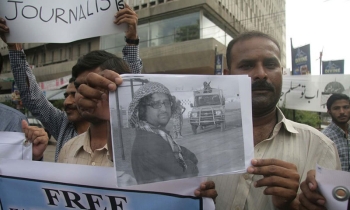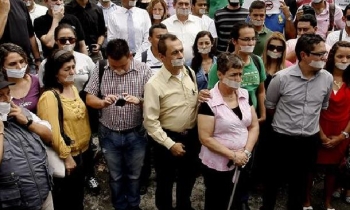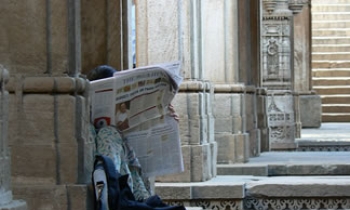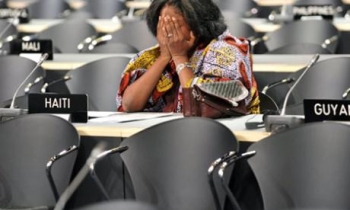WASHINGTON — New York Times managing editor Jill Abramson testified briefly in the CIA leak trial today as defense attorneys tried to undercut the credibility of another witness, former Times reporter Judith Miller.
Abramson was the Washington bureau chief in 2003 when Miller says White House aide I. Lewis “Scooter” Libby told her that the wife of a former ambassador and prominent war critic, Joseph Wilson, worked at the CIA. Libby, who is charged with lying and obstructing an investigation into that leak, says he didn’t reveal that information to Miller.
Miller testified that, after her conversation with Libby, she went to Abramson and suggested the Times look into Wilson’s wife, Valerie Plame.
“Did Judith Miller come to you to recommend The New York Times pursue a story about whether Ambassador Joe Wilson’s wife worked for the CIA?” defense attorney William Jeffress asked.
“I have no recollection of such a conversation,” Abramson replied.
Abramson was one of several journalists who testified in the trial. Yesterday, defense attorneys called some of the nation’s most well-known journalists to discuss their interviews with Bush administration officials regarding Plame.
The jury heard a 66-second snippet of one of the deep-background interviews given to Washington Post editor Bob Woodward for use in one of his books. They also saw a parade of Pulitzer prize-winning journalists discuss who did and did not leak the information that set off a scandal and ultimately brought Libby to trial.
Woodward, who never wrote about Plame, and syndicated columnist Robert Novak, who first identified her in print, testified that then-Deputy Secretary of State Richard Armitage first told them in the summer of 2003 that Plame worked at the CIA.
Another Post reporter, Walter Pincus, testified that then-White House press secretary Ari Fleischer “suddenly swerved off” topic during an interview to tell him of her employment.
This contradicted a point in Fleischer’s testimony last week.
A major government witness, Fleischer testified Libby told him about Plame — earlier than Libby has told investigators he thought he first learned about her from NBC reporter Tim Russert.
On cross-examination, Fleischer also testified that he did not recall telling Pincus about Plame. The reporter’s testimony yesterday was the most direct hit the defense made on the prosecution’s evidence that Libby lied to FBI agents and a grand jury about his talks with reporters about Plame and obstructed an investigation into how her name leaked.
Defense attorneys got Woodward, Novak, Pincus, New York Times reporter David Sanger, Washington Post reporter Glenn Kessler and Newsweek reporter Evan Thomas all to say they had talked to Libby about Wilson’s allegations during the summer of 2003, but Libby had not disclosed Plame’s identity or employment to them.
But Sanger, Kessler and Thomas said they didn’t ask Libby about Wilson’s wife. Woodward and Novak testified they didn’t recall asking about her but said Libby didn’t talk about her if they did. Pincus said Libby said he didn’t know how the trip was arranged, but their conversation occurred before June 12, when Libby now recalls he first learned the information from Vice President Dick Cheney.
Special Prosecutor Patrick Fitzgerald says Libby learned Plame’s identity from Cheney and other officials. Libby repeated that information to reporters, Fitzgerald said, then concocted a story about learning it from another journalist to shield himself from prosecution.
For his part, Libby says he genuinely forgot that the information came from Cheney and, when he heard about Plame a month later from Russert, it seemed like new information, which he relayed to other reporters simply as chatter.
Defense attorneys say Libby had no reason to lie. Why, they ask, would he out Plame to Miller and not take the opportunity to do the same in interviews with Sanger and Novak?
One journalist who avoided the witness stand is NBC’s Andrea Mitchell. Libby’s attorneys said today that they no longer planned to call her to testify because U.S. District Judge Reggie B. Walton would not allow them to ask her about whether she had heard rumors that Plame worked for the CIA.
Meanwhile, Cheney’s national-security adviser today described Libby as someone responsible for the nation’s most sensitive intelligence but whose memory was notoriously spotty.
John Hannah, who served as Libby’s deputy in 2003 and 2004, described a workday that began with a highly classified CIA briefing and continued at breakneck speed from one top-level meeting to the next.
Hannah is a critical defense witness because he bolsters Libby’s argument that he was focused on terrorist threats, foreign intelligence and war planning. And when it came to remembering things in such a fast-paced environment, Hannah said, Libby frequently faltered.
Hannah’s most important role may be as a sit-in for Libby. Defense attorneys originally said Libby planned to testify about all the classified information he was handling at the time. They have since backed away from that.
Hannah offers defense attorneys a much safer alternative. If he can discuss much of the classified information and describe for jurors Libby’s hectic schedule, attorneys may be able to avoid putting Libby on the stand and subjecting him to cross-examination.









